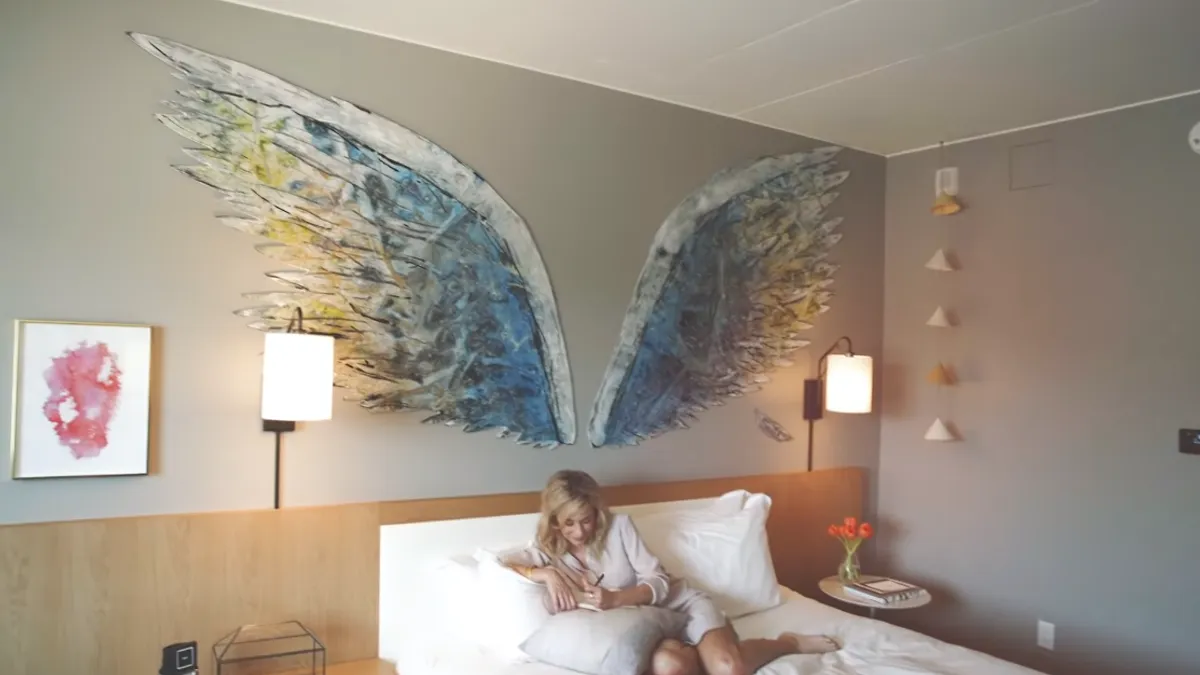Brief:
- Kimpton Hotels & Resorts boosted engagement on Instagram with an experimental social influencer campaign focused on one room at the Kimpton Everly Hotel in Los Angeles. The boutique hotel chain showcased Room 301, an interactive room where guests could leave mementos for the next occupant — through a guest book, Polaroid pictures, message boards and a shared Spotify playlist — according to a case study by Gartner L2 shared with Mobile Marketer.
- In September, Kimpton transformed Room 301 into an "Instagrammable space" by commissioning a local artist to paint a pair of her signature street art angel wings on one wall. Over the next three months, the hotel then invited several social media influencers to stay in the room and share their experiences on Instagram.
- The posts averaged 2,337 interactions, nearly four times Kimpton's average of 720. Two of the most-followed influencers Kimpton partnered with for the Room 301 campaign drove 38% and 95% lifts in average engagement, respectively. Each influencer post included at least one campaign hashtag and location tag for the hotel, and contributed to a shared Instagram Story for Kimpton.
Insight:
Kimpton's effort to transform a traditional hotel room into a shareable experience demonstrates the power of social media influencers and tapping into consumers' interest around authentic experiences. The hotel brand chose influencers based on follower size and audience. While Kimpton partnered with two influencers with large social followings, it also worked with niche influencers, whose posts about Room 301 drove engagement lifts of more than 50%, demonstrating the power of engaged audiences of microinfluencers.
Giving guests a glimpse into the lives of previous occupants through message boards, photos and a shared playlist aimed to appeal to millennials, who tend to seek experiences to share on social media, and forges a connection between hotel guests through cleverly encouraging user-generated content. Transforming the concept of a hotel room from the traditional definition of a place to sleep to a holistic experience could boost brand memorability among guests and instill positive associations with the hotel, potentially leading to future sales.
Per the report, Gartner L2 recommends that luxury hotel brands boost their mobile marketing strategies by featuring user-generated content in hashtag-driven Instagram feeds that work as visual reviews and are linked to featured property pages, where users can get more information on pricing and reservations.
Kimpton's Room 301 campaign comes as luxury hotels are emphasizing Instagram and a stronger social media presence this year compared to 2017, Gartner L2 found, likely to appeal to millennial travelers and remain relevant in the minds of on-the-go consumers. Social and mobile features are growing increasingly important for hotel brands, in particular, to provide guests with personalized service and a smooth, engaging stay. Hilton in September added a feature to its mobile app to give loyalty members access to local employee suggestions of restaurants, attractions and activities during their stay. Hilton is also rolling out a Connected Room to more locations to let guests use a mobile device to control the TV, lighting and room temperature. Last week, Marriott announced a partnership with Pepsi's bottled water brand Lifewtr to deploy augmented reality art displays.














